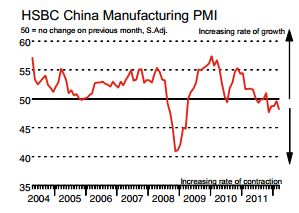While there are significant forms of data risk in European economies this week, the prime market risk will continue to be represented by Greek worries. To that effect, following this weekend’s G8 meeting at Camp David, expect the risk of more detailed thoughts on how Germany and might stimulate growth agendas in Greece and perhaps at home.
There is room for cautious optimism toward Greece should the Troika liberalize the terms of its aid package while Germany and France move toward funding growth initiatives in Greece that may provide Greek politicians with cover before the electorate next month. At this point, however, we have to admit that developments are not favorable to this view. The consensus of economists is expecting the UK to slip into technical recession when Q1 GDP is released on Thursday in one of the week’s key releases that will collectively put the UK economy in the spotlight throughout the week.
That is likely to be preceded by a weak retail sales report for April on Wednesday following the large gain the prior month. UK CPI figures on Tuesday should show moderating inflation with the year-over-year rate expected to drop to 3.3% and thus continue the descent from the 5.2% recent peak in September. Sandwiched in the middle of this will be further detail on the dialogue at the BoE over whether to further expand its asset purchase target when minutes to the May 10th BoE Monetary Policy Council meeting are released on Wednesday. There are also three sets of Euro zone releases that could sway markets.
Of greatest significance are the manufacturing sector purchasing manager indices (PMIs) especially for Germany (Thursday). The May PMI is expected to continue to show a contracting manufacturing sector in Germany but this lies at odds with recent strength in German factory orders. German business confidence will help us determine whether the flattening in the IFO survey since February risks turning toward a negative confidence shock given the tone of developments into May.
Euro Dollar
EURUSD (1.2716) The euro rebounded slightly against the dollar after falling steadily since the beginning of the month on eroding confidence in the eurozone economy.
The euro traded at $1.2773, compared to $1.2693. But earlier in the day, it hit a four-month low of $1.2642, underscoring the worries over a possible Greek exit from the single currency zone and Spain’s weakening banks
The Sterling Pound
GBPUSD (1.57.98) Sterling hit a two month low against the dollar on Friday before recovering slightly, and remains vulnerable to the euro zone’s mounting problems because of the UK’s close links to the region.
Earlier in the session, risk aversion drove the pound to a two-month low of $1.5732, before recovering to trade at $1.5825, up 0.2 percent on the day.
Concerns about the future of the euro zone have seen investors hungry for the safety of the dollar and the yen. Moody’s downgrade of 16 Spanish banks late on Thursday, including the euro zone’s largest Banco Santander boosted the demand for these safe-haven currencies.
This came as Spanish banks’ bad loans rose in March to their highest in 18 years and kept the kept Spain’s borrowing costs at elevated levels. Despite Friday’s recovery, the pound is on track for its third straight week of losses and has lost 2.5 percent against the dollar so far this month.
Asian –Pacific Currency
USDJPY (79.10) The yen was mixed against the other major currencies: the euro rose to 100.94 yen from 100.65 yen late Thursday, while the dollar fell to 78.95 yen from 79.28.
Japanese Finance Minister Jun Azumi said on Friday that he was monitoring currency moves with extra care and was prepared to respond as appropriate – a veiled reference to yen-selling intervention.
Azumi said speculators were over-reacting after the yen rose to a three-month high versus the dollar and the euro. He said he has confirmed with Group of Seven countries several times in the past that excessive currency moves are undesirable.
[quote]We are watching currencies with a heightened sense of caution and are prepared to respond as appropriate. There was a sudden rise in the yen last night that is attributable to some speculators who are over-reacting.[/quote]
The dollar rose 0.2 percent to 79.39 yen, also above a three-month low of 79.13 yen touched the previous session. The euro inched up 0.2 percent to 100.81 yen, off its lowest since Feb. 7 of 100.54 yen.
Japan spent a record 8 trillion yen ($100.6 billion) in unilateral intervention in the currency market last Oct. 31, when the dollar hit a record low of 75.31 yen, and another 1 trillion yen in early November on undeclared forays into the market.
Gold
Gold (1590.15) continued to rebound Friday as the U.S. dollar lost steam and weakened in relation to other major currencies, leaving the metal open for a small advance after two weeks of losses.
Gold for June delivery rose $17, or 1.1%, to $1,591.90 an ounce on the Comex division of the New York Mercantile Exchange. On the week, the metal gained 0.5%.
Crude Oil
Crude Oil (91.48) futures continued on a downward path Friday, on a sixth consecutive day of declines as investors remained concerned about global growth and lessened demand for oil amid plentiful U.S. supplies. Investors also parsed out news that a U.S. pipeline reversal, seen as instrumental in alleviating the glut in oil hub Cushing, Okla., is to start this weekend.
Prices ended the week 4.8% lower, their third week on the red. The Friday‘s settlement was also the lowest since Oct. 26.



